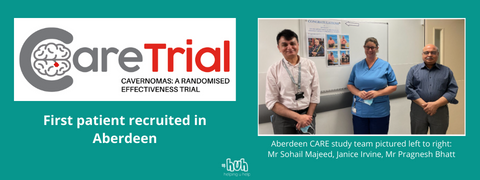What is a cavernoma? Cavernoma are clusters of abnormal blood vessels in the brain or spinal cord that look like raspberries. In the UK 1 in roughly 600 people has a cavernoma, but only 1 in 400,000 people each year are newly diagnosed with a cavernoma that has caused symptoms. Brain cavernoma can lead to stroke or epileptic seizures.
The CARE study is led by Prof Rustam Al-Shahi Salman (University of Edinburgh) and Mr Neil Kitchen (University College London Hospitals Foundation Trust) and is managed by Edinburgh Clinical Trials Unit. The patient support organisations Cavernoma Alliance UK and Cavernoma Ireland are involved. The researchers first went through a priority setting exercise with the James Lind Alliance. This meant that stakeholders (patients, carers, clinicians and researchers) came together to agree the top 10 unanswered questions for Cavernoma. You can find out more about it here https://www.jla.nihr.ac.uk/priority-setting-partnerships/cavernoma/. The top question people wanted answered was if neurosurgical treatment or no treatment improves outcomes for patients diagnosed with Cavernoma. The CARE study seeks to answer this question.
Patients may join the CARE study at hospitals across the UK and Republic of Ireland, including Aberdeen where recruitment is underway . In November 2021, the Aberdeen study team recruited their first participant, who underwent surgery and is doing well. Mr Bhatt, consultant neurosurgeon at Aberdeen Royal Infirmary and local study lead told us: “We are very fortunate to have a great TEAM (Together Everyone Achieves More) here in Aberdeen. Our patients are also very willing to engage with research.”
Recruitment continues across the UK. You can find out more about the study on the Edinburgh Clinical Trials Unit website (ECTU CARE study website) or the Cavernoma Alliance UK website Care Study - Cavernoma Alliance UK (CAUK).
